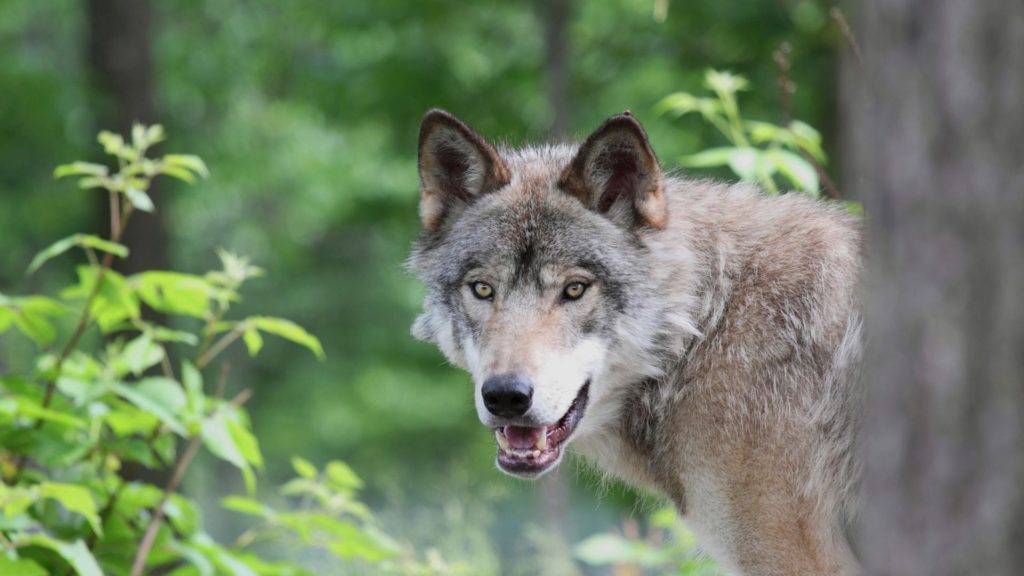A bill that would weaken protections for Washington’s wolves cleared an important hurdle Friday, as the House Agriculture and Natural Resources Committee unanimously voted to approve a slightly amended version of House Bill 1698 despite widespread public opposition.
A substitute bill for HB 1698 moved from Committee on February 17 in spite of the nearly 1,000 members of the public who signed in “con” for the public hearing on February 8. The substitute bill mandates that the Washington Department of Fish and Wildlife manage wolves as though they had been removed from state designation as endangered (rather than “endangered or protected,” as in the original bill) in a county where three or more breeding wolf pairs have been documented, when the statewide wolf population has had at least 15 breeding pairs for three years.
The substitute bill also stipulates that the Department must convene a work group including county cattle producer representatives, county government representatives, a representative of a conservation nonprofit, and several other stakeholders. The Department, with the consultation of the work group and a third-party facilitator, must produce a plan within six months to address, among other things, “faster response time from the department when lethal control is required” and “increased cooperation with input from county governments, cattlepersons associations, and local organizations.”
Despite some changes from the original bill, HB 1698 remains extremely dangerous, as it removes endangered species management from the public process of periodic status review and places it in the hands of local politicians.
Washington Wildlife First was on the ground in Olympia to represent 20 nonprofits against the bill, voicing our concerns in public testimony to the committee that “state endangered wildlife does not belong to people in one or two counties… It should be managed in the public trust for current and future Washingtonians.”
We further pointed out that local management of carnivores has led to “devastating impact” on cougars and increased human-cougar conflict in Klickitat County and other areas. We called for wildlife to be managed in the public trust, by periodic status review.
Zoe Hanley of Defenders of Wildlife explained that counties are “not a biologically relevant scale for recovering wolves,” especially considering the wide extent of wolf pack territories, and that current rules already allow for killing of wolves for preying on cattle. She called HB 1698 an attempt to “kill more wolves faster” and said that wolf status should be set during periodic review.
Retired US Fish and Wildlife Service biologist Carter Niemeyer also pointed out that the breadth of wolf pack territory makes local control problematic. He called for state management of wolves and more use of non-lethal deterrents.
Adrian Treves of University of Wisconsin-Madison testified that Washington’s state wolf population is “too small to be viable” and that liberalization of wolf-killing leads to higher rates of poaching. Non-lethal methods such as range-riding have been proven effective, he said, while so-called “lethal removals” have been shown not to reduce predation on livestock.
Washington Wildlife First Treasurer David Linn, speaking for himself, criticized the bill for prematurely “celebrating wolf recovery” in the face of rampant poaching as well as wolf-killing by officials, and for increasing the likelihood of extirpation of wolves in Washington if passed.
Governmental officials also stated their opposition. The Governor’s office came out against the bill, pointing out that it “would actually end up stripping the authority of our state to protect and manage endangered and threatened species” and that “the impact of that could be far-reaching and damaging.” Even the Department, which has repeatedly jumped to kill wolves, testified in opposition of the bill. Unfortunately, the Colville Tribe, which killed 22 wolves in its last annual reporting, was on hand to support the bill. Conservation Northwest was the sole “conservation” group that delivered testimony as “neutral.”
Although the Fish and Wildlife Commission had not had time to reach an official position, Commissioner Lorna Smith stated her support for the Department’s position on the bill and informed the Committee that the Fish and Wildlife Commission is currently conducting a status review on endangered gray wolves.
Despite the majority of the public weighing in against this dangerous bill, the fight to stop HB 1698 is far from finished. The bill is currently in the House Appropriations Committee. We will continue to monitor this and other attempts to undermine protections for endangered wolves.
